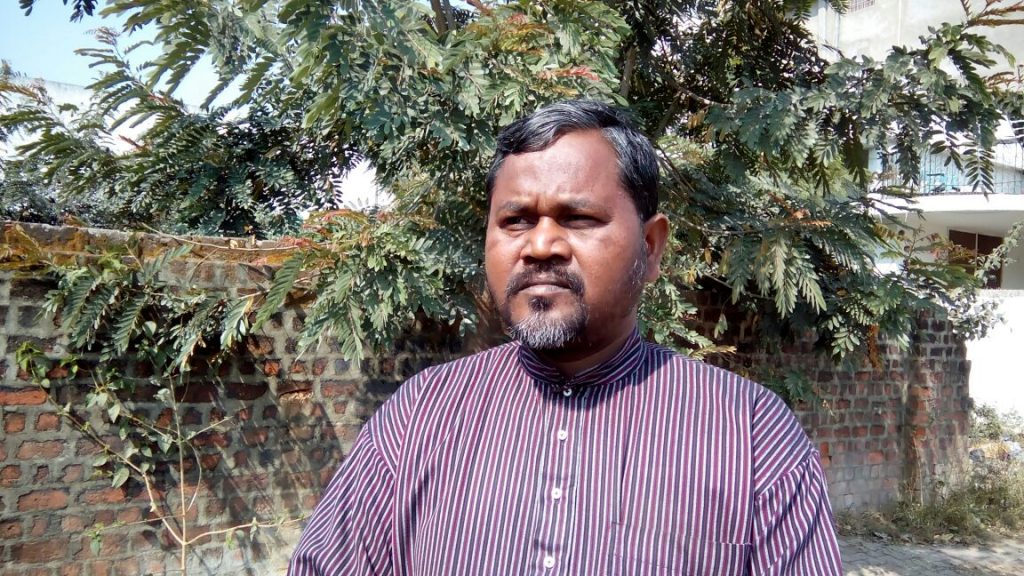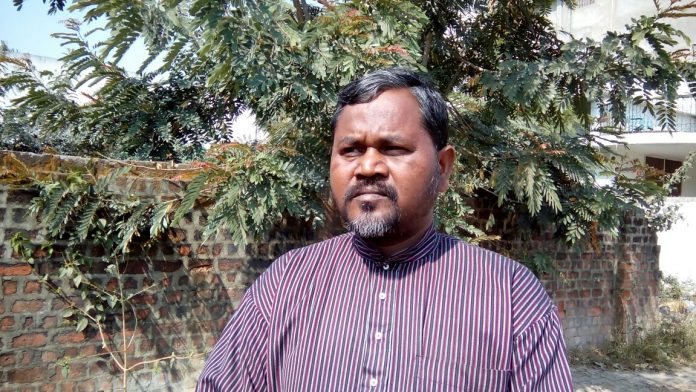
By Amit Kumar, TwoCircles.net
For 31 of his 49 years, Gangaram Paikra has had one clear agenda: to work in the place he was born, and for the people of his area. He has worked in support of Forest Rights, Right to Food, tribal rights over land and natural resource and education.
Paikra, an eminent Adivasi activist from Sarguja, Chattisgarh and the President of Chaupal Gramin Vikas Prashikshan Evam Shodh Sansthan however, believes that his best and most passionate work has been to ensure that the Right to Food makes a positive change in the lives of the local people, mostly Adivasis. Over the past decade, his efforts have ensured that not only do people in Sarguja get ample opportunities to avail the Public Distribution System (PDS), they also utilise PDS to sell their produce to the government and increase self-sufficiency.
Paikra knows a thing or two about the need for a strong and effective PDS system: as the eldest son of two farm labourers, he did not get many opportunities to study. “Our childhood was very tough. There were days when food was an issue…I wanted to study, but I could never go beyond Class 7 as we neither had the money nor the resources,” he says.
But Paikra knew his district well and wanted to continue working here. In 1985, he started with social organisations that were trying to help residents fight against bureaucratic corruption, especially that of the lower-level officials. “That time, there was no concept of NGOs, at least in our district. We were just people who would get together, and try solving the problem,” he says. It was while working on this issue, that he realised that there was a huge gap between the funds allocated by the government versus the money spent on the ground (if any). From 1990 onwards, he worked with various other national and state-level social organisations to help plugs gaps between government allocation and spending, especially in the areas of education and health.
In 2002, he started working on the Supreme Court order regarding the Right to Food and soon realised that while the ‘Right’ was both important and welcome, the guidelines left a lot of scope for manipulation and corruption at the hands of the officials. “Between 2002 and 2005, all my time was spent on meeting officials and pointing out the gaps in the system,” he said. “A PDS can never work unless the ration shops remain open for long periods, and are located close to the villages. Initially, the Chhattisgarh government refused to open the mistakes in implementation. But how was this system, which is supposed to make life easier for people from the lowest strata, supposed to work when you have one ration shop for six panchayats?” he asked. Paikra, along with other local activists, had to spend nearly a year in trying to get the top officials to come and inspect his district. “The officials closed down at least 1,200 ration shops in various districts including ours, and took action against erring officials,” he says.
But for Paikra, there was another issue that hounded him and the locals, and he sought to address it after the new guidelines for PDS came in 2005. “The 2005 guidelines made it mandatory to ensure that the rice and other grains are sourced locally,” he said. The PDS system was also expanded to ensure that it was not just the people below the poverty line who benefited from it, but also people who were above the poverty line. “Until then, most of the rice we consumed came from Odisha, and as usual this meant a lot of profit for corrupt officials,” he says. So, from 2005 onwards, Paikra met the officials and leaders to ensure that the rice is sourced locally. “Surguja people depend mostly on farming, but were never much into selling rice to third parties,” says Paikra.
“However, in due time, they realised that they could sell the rice to the government at the minimum support price, and then avail the same as part of PDS. This also ensured that we continued to receive local, thick grained rice in our PDS and not hybrid rice, as earlier,” he said. This move, which materialised over 2006 and 2007 ensured a source of living for over 60% of the local population. In time, other grains like Bajra, Jowar, and Ragi were also incorporated in the PDS. “Thanks to these steps, today we can proudly say that Sarguja has one of the best PDS in the country; let alone the state. Every panchayat has a ration shop now, and all families can avail it without any issue,” he said.
In 2006, Paikra also got together with other like-minded people to form Chaupal, a collective of five NGOs in the state. “Being organised helps us identify specific issues in each district, and we can apply for grants accordingly. Currently, our biggest priorities are fighting malnutrition and ensuring that the forests and the resources remain in the hands of the locals,” he says.

